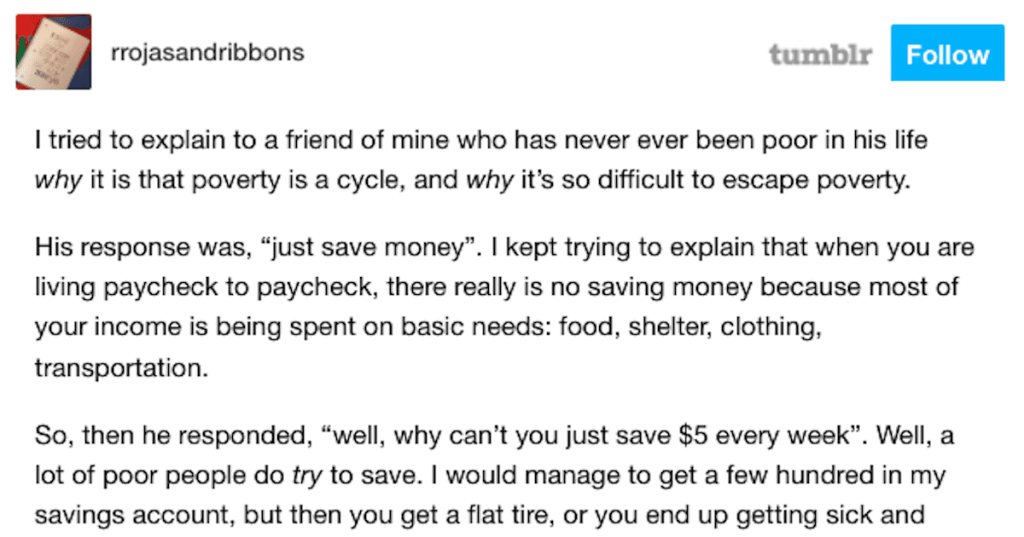Trending Now
I was lucky enough to grow up in a solidly middle-class household, so I really don’t know what it’s like to live in real, inescapable poverty.
But we all know that there are countless people out there who are caught in a perpetual cycle of poverty that has plagued generations of families.
Read the person’s moving and insightful post below that they shared on Tumblr about how they tried to explain how the cycle of poverty works to a friend of theirs.
“I tried to explain to a friend of mine who has never ever been poor in his life why it is that poverty is a cycle, and why it’s so difficult to escape poverty.
His response was, “just save money”. I kept trying to explain that when you are living paycheck to paycheck, there really is no saving money because most of your income is being spent on basic needs: food, shelter, clothing, transportation.
So, then he responded, “well, why can’t you just save $5 every week”. Well, a lot of poor people do try to save. I would manage to get a few hundred in my savings account, but then you get a flat tire, or you end up getting sick and missing a week of work, or you have an unexpected bill. And, that few hundred dollars suddenly disappears. I tried to explain to him that when you’re poor, unanticipated expenses can very quickly and easily blow through what little you have in your savings account and put you back at square one.

Photo Credit: Pixabay
I also tried to explain that when you are that poor, you need to make purchases while you have the money. Like, if I needed a new pair of jeans and I had an extra $30 that week, I would buy myself a new pair of jeans that week because I didn’t know when I would have an extra $20 or $30 to spend. So, he countered that with, “You don’t need to buy clothes. You could have put that $30 in your savings.”
To which I responded, “Well, if it were socially acceptable to walk around without pants on, then maybe poor people could climb out of poverty, but until then, when your jeans have holes in them, or don’t fit you anymore, you need to get some new ones.”
Then it kind of clicked for him.. a little.
So, I went on to talk about the sociological aspects of poverty, like how growing up poor, or growing up as part of a marginalized demographic pushes your starting block 100 feet behind your peers.. how our educational systems are set up to fail impoverished children. The light bulb flickered, but never fully turned on.

Photo Credit: Pixabay
And, then he said, “I still can’t believe you were ever on food stamps.”
Yes, my friend, poverty and I get a nice little reunion every few years. I know it intimately, which is why you should sit back, relax, and just listen.
I never understood how it was so difficult to see the realities of poverty. To me, it is sort of common sense. And, what is irksome is that poverty doesn’t always present itself as an old beat up car, and falling apart sneakers. People who grow up middle class and financially secure seem to think that poverty looks a lot like dirty children with dirty clothes, and no shoes. But, it doesn’t. It can be that, but it’s often not.
I grew up in a nice house in the suburbs, but we were poor. We were very poor for a long time, in part due to my medical issues. People assume that because we went to Catholic school, and had a nice house that we were well-off. We weren’t. My mother worked 2-3 jobs, and my parents took out loans to pay for our school tuition. My mother’s parents helped pay for some of our education, even though they were also incredibly poor. My parents sometimes struggled to put food on the table.

Photo Credit: Pixabay
I never had clothes that were dirty or falling apart, but most of my clothes and shoes were hand-me-downs from my older cousins. In fact, a lot of my toys were, too.
Both of my parents grew up in poverty. My father, especially, grew up in complete and abject poverty. Their parents grew up in poverty, and so did their parents. My parents made immense sacrifices to set us up for financial success, but life always finds a way to intervene.
Personally, my health issues have been the driving factor behind my own financial issues. I have amassed thousands of dollars in medical debt. I work a job that doesn’t use my degree at all because I can work part time and still get benefits, and because I know I won’t get fired if I need to take extended absences due to my health.
So, when you say, “I still can’t believe you were ever on food stamps,” you are really saying, “I have this picture in my head of what poverty looks like, and you don’t fit that image.”
That idea we have about what poverty is supposed to look like is a big reason why people in the middle class are so content with cutting safety net programs, even though they are one medical problem, one car accident, or one lay-off away from complete financial ruin. What does poverty look like, then. How do you “just save money”, then.”
What do you think about this story?
Talk to us in the comments and let us know.
Thanks in advance!






